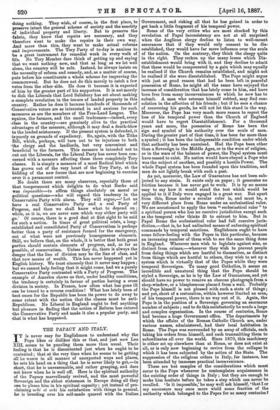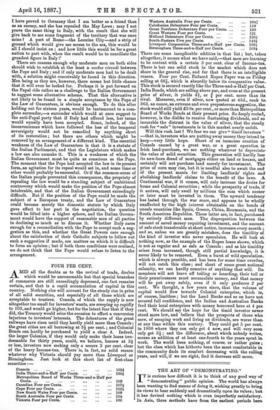THE PAPACY AND ITALY.
TT is never easy for Englishmen to understand why the Pope likes or dislikes this or that, and just now Leo XITT seems to be puzzling them more than usual. Their feeling is that he is discontented just when he ought to be contented ; that at the very time when he seems to be getting all he wants in all manner of unexpected ways and places, he sets his head on a thing that he is never likely to get,—in short, that he is unreasonable, and rather grasping, and does not know when he is well off. Here is the spiritual authority of the Papacy marvelously revived, and the most powerful Sovereign and the ablest statesman in Europe doing all they can to please him in his spiritual capacity ; yet instead of pro- claiming urbi et orbi his satisfaction with things in general, be is brooding over his self-made quarrel with the Italian
Government, and risking all that he has gained in order to get back a little fragment of his temporal power. Some of the very critics who are most shocked by this revelation of Papal inconsistency are not at all surprised when the Anglican clergy decline to listen to well-meant assurances that if they would only consent to be dis- established, they would have far more influence over the souls of the nation. On the contrary, they think the clergy quite in the right. They reckon up the many losses which Dis- establishment would bring with it, and they decline to admit that these would be compensated by a gain which may equally be realised if the Church remains established, and might not be realised if she were disestablished. The Pope might argue with just as good reason that had he been left in peaceful possession of Rome, he might all the same have enjoyed the increase of consideration that has lately come to him, and have been free from many inconveniences to which he now has to submit. A man who esteems himself robbed, may find con- solation in the affection of his friends ; but if he sees a chance of recovering his goods, he will not let this stand in the way. Moreover, the Pope has very much more reason to regret the loss of his temporal power than the Church of England would have to regret Disestablishment. For a thousand years and more, the possession of Rome has been the sign and symbol of his authority over the souls of men. During the greater part of that time, it has been far more than a symbol ; it has been the indispensable condition under which that authority has been exercised. Had the Pope been other than a Sovereign in the Middle Ages, or in the wars of religion, or in the wars of the balance of power, the Papal system must have ceased to exist. No nation would have obeyed a Pope who was the subject of another, and possibly a hostile Power. The whole Papal system has been founded upon this tradition, and men do not lightly break with such a past. As yet, moreover, the Law of Guarantees has not been sub- jected to any strain. It exists only on paper ; it generates no friction because it has never got to work. It is by no means easy to say how it would stand the test which would be applied to it if Italy were engaged in a great war. But apart from this, Rome under a secular ruler is, and must be, a very different place from Rome under an ecclesiastical ruler. We are accustomed to apply the term " ecclesiastical ruler " to a spiritual person who has no coercive jurisdiction except such as the temporal ruler thinks fit to entrust to him. But in Papal Rome the ecclesiastical ruler had fall coercive juris- diction,—that is, he had unlimited means of enforcing spiritual commands by temporal sanctions. Englishmen ought to have some fellow-feeling with the Popes in this particular, because an increasing number of them wish to see the same thing done in England. Wherever men wish to legislate against sins, as distinct from crimes,—wherever they wish to prevent people from doing things which are hurtful to themselves, as distinct from things which are hurtful to others, they wish to set up a system which is virtually that of the Popes while they were temporal Sovereigns. To many good Catholics, it seems an incredible and unnatural thing that the Pope should be styled a Sovereign, as he is by the Law of Guarantees, and yet should have no power to remove an obscene photograph from a shop-window, or a blasphemous placard from a wall. Probably the Pope himself is not pleased with such a state of things ; and yet, short of a restoration, within however limited an area, of his temporal power, there is no way out of it. Again, the Pope is in the position of a Sovereign governing an enormous number of subjects ; and to do this satisfactorily he needs a large and complex organisation. In the course of centuries, Rome had become a huge Government office. The departments by which the affairs of the Roman Catholic Church are, under various names, administered, had their local habitation in Rome. The Pope was surrounded by an array of officials, each taking his orders from himself, and each transmitting them to subordinates all over the world. Since 1870, this machinery is either set up elsewhere than at Rome, or does not exist at all, or is only now beginning to revive from the collapse to which it has been subjected by the action of the State. The suppression of the religious orders in Italy, for instance, has been attended by immense practical inconvenience.
These are but samples of the considerations which most occur to the Pope whenever he contemplates acquiescence in the existing order of things in Italy ; but they are enough to make him hesitate before he takes a step which can never be recalled. 'Is it impossible,' he may well ask himself, that I or my successors may once more wield some fraction of the authority which belonged to the Popes for so many centuries f I have proved to Germany that I am better as a friend than as an enemy, and she has repealed the May Laws ; may I not prove the same thing to Italy, with the result that she will give back to me some fragment of the territory that was once mine A part of Rome—the Leonine City—and a strip of ground which would give me access to the sea, this would be all I should insist on ; and how little this would be 'for a great nation to part with, when the result would be to conciliate the grandest figure in Italy l'
There are reasons enough why moderate men on both sides should wish to establish at the least a mans vivendi between the Pope and Italy ; and if only moderate men had to be dealt with, a solution might conceivably be found in this direction. Men being as they are, however, there seems but little chance that it will even be looked for. Perhaps it is put forward on the Papal side rather as a challenge to the Italian Government to suggest some alternative scheme. That this alternative is not likely to be found in a simple acceptance by the Pope of the Law of Guarantees, is obvious enough. To do this after holding out for sixteen years, would be tantamount to a com- plete surrender,—a surrender which would at once suggest to the anti-Papal party that if Italy had offered less, her terms would equally have been accepted. Some, indeed, of the inconveniences which have followed the loss of the temporal sovereignty would not be remedied by anything short of its restoration ; but there are others which might be removed by an arrangement of a different kind. The essential weakness of the Law of Guarantees is that it is a statute of the Italian Parliament, and that the Legislature which makes a law can also unmake it. This is a weakness of which the Italian Government must be quite as conscious as the Pope. The moment that the Pope had accepted the law in its present form, an agitation for its repeal would set in, and some time or other would probably be successful. Or if the common-sense of the Italian people prevented this consequence, the propriety of repealing the law would be a standing subject of embittered controversy which would make the position of the Pope almost intolerable, and that of the Italian Government exceedingly difficult. But if the position of the Pope could be made the subject of a European treaty, and the Law of Guarantees could become merely the domestic statute by which Italy gave effect to her part in the negotiation, the question would be lifted into a higher sphere, and the Italian Govern- ment would have the support of reasonable men of all parties in declining so much as to discuss it. Whether Italy cares enough for a reconciliation with the Pope to accept such a sug- gestion as this, and whether the Great Powers care enough about the satisfaction of their Catholic subjects to follow out such a suggestion if made, are matters on which it is difficult to form an opinion ; but if both these conditions were realised, we do not think that the Pope would refuse to listen to the arrangement.



































 Previous page
Previous page